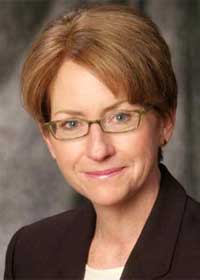Northern Illinois University’s Ph.D. program in history has earned a prestigious Top 100 designation by U.S. News & World Report, ranking 92 among the nation’s history programs.
“Doctoral students must have a master’s degree to be admitted to our program, so they arrive with solid skills in analytical reading and writing,” said Anne Hanley, associate professor and director of Graduate Studies in the Department of History.
To earn their doctoral degree, students must complete a minimum of 24 hours of course work beyond their M.A., demonstrate proficiency in two languages, pass a candidacy exam, conduct original research in their field and write and defend their dissertation.
The program takes six to seven years on average to complete.
“We focus on research skills and acquisition of depth and breadth of knowledge in their fields of specialization,” Hanley continues.
The program only admits students in the fall semester, based on the department’s confidence in the candidate that they have the skills and background they need to be able to successfully complete the degree. Additionally, it is important that the candidates’ research interests align well with the interests of two faculty members. Therefore, admissions rates to the Ph.D. in history program vary.
“For example, in the fall of 2011, we admitted two-thirds of applicants to our Ph.D. program because the pool was both very strong and very well-suited to our program’s strengths,” Hanley said. “For the fall 2012, by comparison, we admitted 47 percent of the applicants to our Ph.D. program.”
This Top 100 ranking did not come without a significant effort to make sure that NIU’s program offers a unique experience for its students.
“We put a great deal of thought into what our departmental strengths are, what the market for historians looks like and how those elements should be combined to best train our graduate students for eventual careers in academia,” Hanley said.
While most graduates of the Ph.D. in history program move on to teach, many others have moved on to distinguished careers in think tanks, government agencies, and historical archives and museums including The Smithsonian, The National Security Archive and The Asia Foundation.
The Department of History has built up a strong appreciation and respect from its students. By nature of the program’s design, students are quite involved with, and connected to, the department and its faculty.
“I completed my M.A. here in 2009,” alum and Ph.D. candidate Greg Bereiter said, “and had such a positive, valuable working relationship with my adviser, professor Brian Sandberg, and other professors with similar research interests, that it would have been foolish to give that all up and start over elsewhere.”
But the most valued part of the program for some of the Ph.D. candidates is their peers.
“Personally, I value the sense of camaraderie and mutual support that prevails among our graduate students,” Bereiter said. “From what I hear from my friends in history programs at so-called elite schools, we have incredibly less internal rivalry, dissimulation and jockeying for prestige. In other words, all of us feel that we’re ‘in this together,’ so to speak.”

